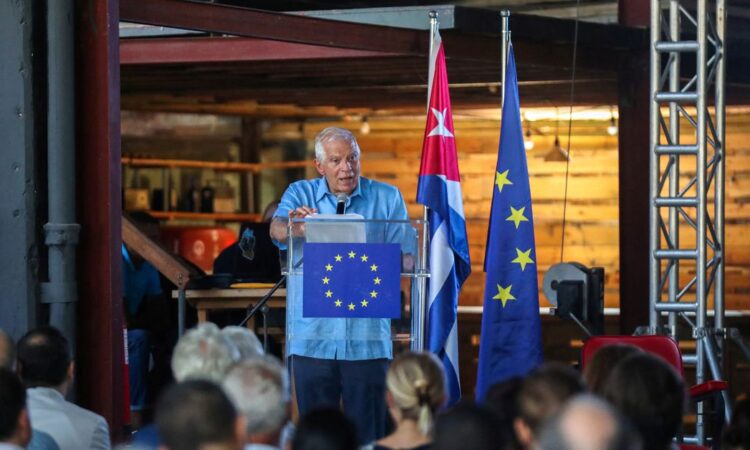
[1/3] EU High Representative for Foreign Affairs and Security Policy Josep Borrell talks with Cuban businessmen during an official visit to Cuba, in Havana, May 25, 2023. REUTERS/Yander Zamora
HAVANA, May 25 (Reuters) – The European Union´s top diplomat said in Havana on Thursday that the 27-member bloc remains Cuba´s top trade partner, and one committed to “mutual respect” despite U.S. sanctions and the communist-run island´s increasing overtures towards Russia.
EU foreign policy chief Josep Borrell, during his first public appearance on a four-day trip to Cuba, told a group of local entrepreneurs the European Union was also the second-largest source of tourists to Cuba, behind Canada.
“Despite all the limitations [and] the restrictive measures of the U.S. blockade, which does not make things easy, we are [Cuba´s] principal trade partner,” Borrell said.
The United States imposed a trade embargo on Cuba shortly after Fidel Castro´s 1959 revolution, a relic of the Cold War which continues to complicate financial and banking transactions with the Caribbean island nation.
Such sanctions, Cuba says, have contributed to its recent drive to increase commercial and trade ties with Russia, which has also faced sanctions from both the United States and the European Union following its invasion of Ukraine.
Cuba has said Russia is not responsible for the Ukraine conflict, blaming the United States instead.
The EU´s Borrell, who spoke with entrepreneurs and fellow European diplomats Thursday, said “it is clear that we are much more important [in terms of trade] than other partners such as Russia and China.”
He said the EU accounted for about one-third of foreign trade on the island, “versus 8% by China or 8% by Russia.”
Borrell announced during his talk with entrepreneurs a 14 million euro fund to help promote small business in Cuba, a sign of the EU´s “desire to accompany Cuba in its process of … economic and social reforms in a relationship of mutual respect,” he said.
The European Union, a long-time trade partner with Cuba, has previously expressed concern over human rights on the island following anti-government protests in July of 2021, the largest such demonstrations in decades.
Borrell said on Thursday that he hoped to meet with Cuban officials to discuss human rights before the end of 2023.
Reporting by Nelson Acosta; Editing by Dave Sherwood and Andrea Ricci
Our Standards: The Thomson Reuters Trust Principles.






